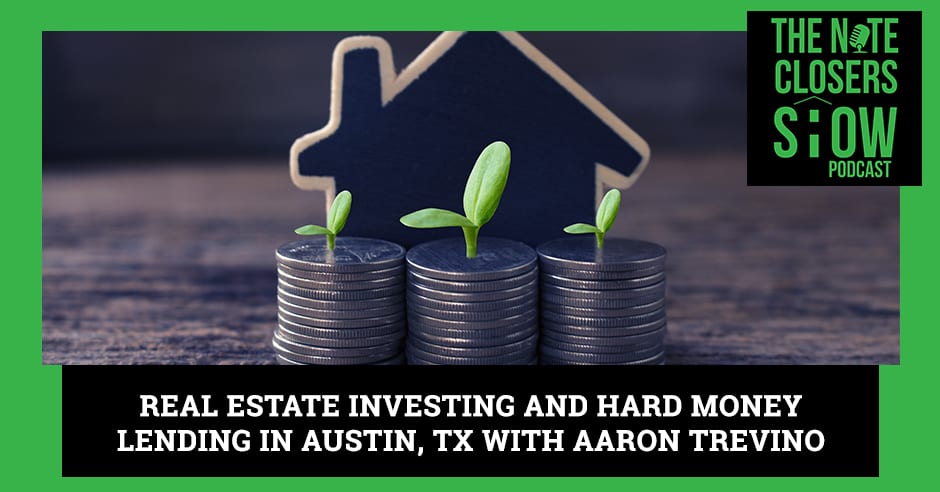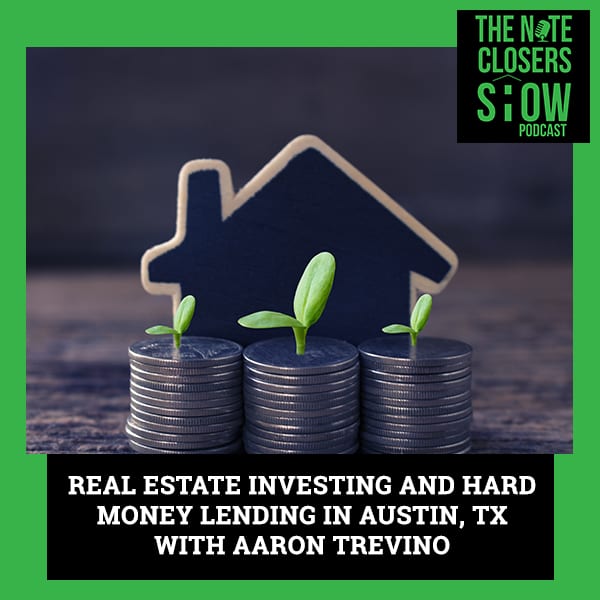
If you’re looking for a real estate market that is doing quite well despite the pandemic, Austin, Texas is way up there on the list. With relatively low unemployment and default rates compared to other major cities, and a skyrocketing demand for real estate, Austin is a good place to invest. Scott Carson treats us to a peek of the hard money lending and market statistics of this real estate hotbed with local hard-money lender and investor-focused realtor, Aaron Trevino. In this episode, Aaron tells us why he is optimistic about a healthy market for fix/flip deals and new construction in the city. He also walks us through some of the due diligence you have to perform if you’re in new construction. If you’re anywhere near Austin, or even if you’re from another state and want to get a piece of the Austin boom, this episode is a good place to start.
—
Watch the episode here
Listen to the podcast here
Real Estate Investing And Hard Money Lending In Austin, TX With Aaron Trevino
I’m excited to be here with you. I’m excited to be talking about my home market, Austin, Texas baby. It is a beautiful place. It has been home since I graduated from Texas State University in San Marcos or Southwest Texas State. As we like to say, “Go Bobcats,” down the road there. I flipped the coin, ended up settling in Austin, and it’s been pretty much home for many years, except for about the 3 to 4 years I was traveling. It was always nice to come home, whether it’s a flight or drive or something in the air, such a warm and hip environment, very friendly people because it’s a beautiful city to live in. I’m excited to have a buddy of mine who is a double-barrel force to be reckoned with here in the Austin market. Not only is he a successful realtor here who works with investors, but he’s also a stud over on the lending side of things as well. He does a great job knocking some things out there as a private money lender in Austin, Texas, but I won’t take too much away from him. We’re honored to have my buddy Aaron Trevino join us. What’s going on, Aaron?
Scott, I appreciate you having me on. Thanks.
I was very honored to be a guest on your podcast and we found out both of us originate from Corpus Christi, Texas, which makes us a small world out here. You moved here in Austin, Texas. Tell us a little bit about the two things that you’re doing with your busy days.
First and foremost, I appreciate the introduction. Double barrel. I’ve never heard that, but I’m going to run with that. I like it. My name is Aaron Trevino. I first moved here to Austin in 2012. I went to UT so I’m familiar with the area. As with Scott, I was away for a few years traveling. I ended up coming back to Austin and calling it home. In terms of the double barrel, I worked for a lender. We work with builders, developers, brokers, agents, flippers, and then I’m also a realtor.
Let’s talk about the real estate market here in Austin, Texas. It’s probably one of the most competitive in the country, whether you’re looking to buy a home or you’re invested here, trying to focus on the market. Would you agree to that, Aaron?
Absolutely.
What would you say your clientele basis is for the most part when you’re dealing with the property you’re in Austin, Texas? You’re not working with conventional mom and pop buyers. You probably have a little of that, but are you working more with investors or your traditional buyers and sellers?
Both, but I could probably start more so with investors. There are a lot of different places you can invest in Austin. You have more of the Lake areas, probably Northwest, West Austin. Those lots are getting pretty popular. A lot of people are wanting to build out there. You have Tesla coming in the Southeast Austin, Del Valle area. That area is going to blow up as well.
That came out with the Tesla trucks relocated here with a production plant and stuff like that. That property out in the East, Southeast side. It can get more expensive than it has in a while for the most part. On the lending side, let’s talk about that a little bit because a lot of people are curious of what’s going on in the lending side. Let’s talk about it.
I work for Streamline Funding here in Austin. We’re in Northwest Austin, near the Arboretum. We’ve been in the business since 2002. We’re one of the original private money lenders here for real estate projects. We work with builders, developers and investors. I would say the majority of our business is with new construction. A lot of times, for example, a client will find a property with maybe a small 900 square foot house on it. They’ll tear the house down and then they have the lot and they build a new construction home on it.
What kind of LTVs are you guys lending and interest rates? I know it’s going to vary a little bit across the board but give some of our readers out there a bit of an idea. Is that below 3% interest rates that people are talking about here from the fed and stuff like that? Are we talking a little bit more aggressive mezzanine or hard money percentages?
I wish it was that low. It’s not exactly around 3%, but to answer your question, LTV is generally around 70%, and then in terms of interest rates, it ranges from 12% to 13.5%. It’s pretty aggressive, but a lot of our clients are happy with what we do. We give you a lot of leverage and enable you to get to close quickly within 7 to 10 business days and move on.
That’s the beautiful thing now because it’s project finance, it’s not so much borrower finance for the most part, correct?
Correct.
Are there any points involved, 2, 3, 4 points or any origination points, stuff like that too, as well, depending on the investor or the borrower?
It depends on the investor or borrower, but generally 2 to 4 points.
Your term, are we talking six months, a year with a renewable six months extension or anything like that?
All our notes are written for one year, so twelve months. If push comes to shove, you may need more time. We have 3 to 6-month extensions if you need it.
With the values staying steady here, are you guys going off of as-is or are you going off of after repair values?
I’m going off after repair values.

Austin TX Real Estate: Make sure you do your due diligence and have an exit strategy in mind.
For somebody who’s building a property, what are some of the things that they need to provide in terms of helping them determine the ARV? We know it can depend on the type of rehab they’re doing and the materials are put into the property, but what do you like to see for you guys to approve projects?
I’ll give you an example of a project, a deal that I’m doing now and the deals we’ve done in the past. We have one in Houston right now. We have a client. He purchased a property. It had a 900 square foot house on it. He sent me a text of the demo. They did the demo. You tear the house down, you clear the lot and you prepare to build. We do have those sorts of builds. In his case, we would require a warranty deed showing how long he has owned the property. What did you pick it up for? We would go based off that. We’ll also ask for a detailed construction budget. Figuring out what the exact materials you’d be using, we’d ask for plans and elevations, things like that.
Do you know if you guys have started to see anybody’s project stretch out a little bit with all the craziness going on in the market right now? People asking for extensions or people having to drop their sales price, trying to get stuff moved because the market is getting competitive?
As of now, no, I haven’t. I don’t think that the market is at that point. Maybe in 2021, we’ll probably feel it a bit more, but right now, not so much.
Austin stayed pretty nice as far as we haven’t seen price reductions. I haven’t seen quite the impact. In some other areas like Houston and Dallas have been hit a little bit harder on that higher price point. That brings me to the next question. What’s the minimum loan amount that you guys will do and the maximum amount? It will vary on the project for the maximum side, but give our readers an idea of loan amounts to look for.
At the bare minimum, probably $50,000, anywhere, less than $50,000, given the interest rate and the points, it’s not favorable to a client. It wouldn’t be worth your time and money if it was less than that. Probably a minimum of $50,000 and then max right now at $1 million, but we’re getting a little bit more flexible and trying to increase the loan amount.
It depends on the price. With $1 million, we look at the median home price is roughly $300,000 across the board, where I’ve seen it before. You mentioned early on about the Lake Travis lots. A lot out there is $1 million by itself for the most part. It’s pricey out on Lake Travis. You’re not going to build a $50,000 shack out there unless you put outside there for the most part. What would you say is probably the biggest mistake that you see people that are going to you guys for financing besides the smaller loan amounts? What are some of the mistakes that you see people make that maybe they’re not prepared or they didn’t know about, that they didn’t think about when applying for a loan or were looking to get a hard money loan from you?
It may sound a little cliché but making sure all of your ducks are in a row. Making sure you do your due diligence and you have an end goal in mind. You have an exit strategy. If someone’s looking to build a home, their exit strategy is to eventually sell. If it’s their first time, they’re getting into it, getting their feet wet. Maybe they don’t have the plans and elevations. Maybe they haven’t talked to an architect, maybe their construction budget is not itemized and detailed and saying, “I’m going to use all of these different materials and my final costs will be $135,000 to build,” or whatever it may be. Having a good team around you and formulating a good plan.
You’ve got to put a plan together, know exactly what you’re putting in. It’s always different too. If it’s a complete rebuild versus a rehab, there’s a lot that goes into the difference in the two. I won’t say you guys are lending all across Texas and you’re probably not lending in smaller communities. You’re staying pretty much the big figure metroplexes across the state, correct?
Sure. I would say all across Texas. All the major Metro areas, Houston, Austin, Dallas, Fort Worth, San Antonio, but we’ll do Killeen, we’ll do Temple, Copperas Cove. We’ll do smaller secondary markets as well.
I meant probably not down to some small town like Ingleside. Not like that, right?
We had one and then deals deeper in South Texas, Edinburg, and different areas.
On the real side, let’s throw your other hat in here. The other barrel here for you a little bit there. You’ve been a realtor here in Austin for a while now. Where do you think the market is going to be here? Do you think we’re going to see a lot of defaults? Do you think we’re going to stay level for a little while or see a big increase or decrease? It will probably vary across markets, but if you could look at a crystal ball, Aaron, what would you predict what’s going happen here in Austin, Texas?
If I had that crystal ball, I’d be a much richer guy. Everyone wishes they had that crystal ball, but if you’re simply looking at the data, what’s interesting about Austin, you can have multifamily projects. Maybe you’re a multifamily developer investor, whatever it may be. This whole situation was unprecedented. What’s interesting is that people are still paying their rent on time for the most part. If you look at most of the raw data, people are generally paying their rent on time. In terms of defaults, it seems it’s a little bit early to tell. We would have a better idea of this probably in January, February of 2021. That’s hard to tell, but maybe this is me being a pro-Texan, but it seems like Texas is in its own little category, a bit more recession-proof compared to other places in the country.
Definitely in the bigger markets, I would agree to that. With our national default rate being under 8%, Texas has a little bit higher default rate than the rest of the country. Austin though is lowest out of the major cities for unemployment and default rates, which is great. You mentioned a couple of things on there too. We have a very low inventory available housing for the most part. We’re usually running at 2.5 months or less of inventory, right?
That’s right.
What do you see as far as projects that are getting built that are almost like an automatic approval for you guys? Are you talking like apartment complexes or multifamily stuff? Obviously, the project has to hold water for it, but on the stuff that you see with your realtor hat, and then also on the lending side of things, I know apartments are one of the most overpriced aspect of things. It’s almost cheaper to build from the ground up if you can find a spot versus trying to take over an existing one, right?
Yes. A true testament to that is that most of our business is with developers and builders. Most of our businesses have new construction. A lot of times, people are wanting things custom made. I was talking to one of my friends and he was talking about buying a house. He’s wanting to start a family. He’s saying, “We need a starter home. We only need X amount of square feet. I don’t need this enormous house.” There’s supply and demand, but you’re having the Baby Boomer parents, they have these larger homes. When time goes by, their children wouldn’t want to buy those homes. What do you do? Maybe you tear a smaller house down and you build brand new from the ground up.
That adds to the question of the price points that are moving like crazy. Are they the $200,000 and below, $300,000 to $600,000? The median price range being crazy, it’s $350,000 to $380,000 somewhere around for the most part. That’s not your first time home buying. It’s usually that $150,000 or $250,000 or less. You’re not going to see most of that in Austin. It’s going to be in other areas, the outskirts like Taylor. Leander may be a little bit there for you. It’s hard to believe those outskirts have been skyrocketing in the last few years. If something is a decent looking property, what’s selling like crazy on the MLS? Are you seeing a higher price point from maybe other people outside of state moving here or that are looking to move up or move down?
It depends, but it also seems like that lower to a mid-range price point. It seems like if there’s a time for Millennials to move and to try to buy something, Millennials, Gen X, a lot of them are trying to move right now because they see there is a bit of opportunity. It seems like we’re seeing more activity with that particular demographic compared to years past.

Austin TX Real Estate: With a relatively low default rate to date, Texas seems to be more recession-proof compared to other places in the country.
What do you like the most between being a realtor and being a lender? Which one do you enjoy more than anything else, if you can be honest without offending anybody else? We all run in different things. You’re double barrel. That works well together, whether it’s on the lending side or the real estate side of things, but on the stuff with what the market is right now, what are you enjoying between the two?
They’re both pretty good, but I’ll probably pick lending. Lending is pretty interesting. To some, it may be a bit dry and boring, but if anything, what you’re looking at is the birth and death of a deal. You’re trying to formulate, “Is this a viable project? Will this work? The land is worth X amount. My construction is worth X amount.” It’s almost like you’re given a bunch of puzzle pieces and you’re trying to put them together to give to your client.
Being an ex-mortgage banker and broker too, it’s always that project. Let’s get everything to fit together and match it all up there. Being a traditional lender, then you’ve got the borrower piece and making sure that falls and things. With hard money with Streamline there, you guys say, “We’re project-driven. You don’t have to worry about the borrower a little bit, but let’s see if the project checks off and goes from there.” Maybe you don’t know, maybe you do. I don’t know. As I would get deals in from different banks, whether it was REOs or notes that was foreclosing on, one of the things that I would do to market would be to reach out to a local hard money lender and say, “Would you pre-approve this project for financing if A, B, and C applied?” Is that something that you’ve done for any other investors out there or it would be something that you could do?
Yes. When it comes to those sorts of projects, we would ask them to fill out a loan application, get a bit of information background on them, your experience. Once you approve that on file, we can write you a proof of funds letter.
I meant more so somebody is looking, say they don’t want to take and do the rehab. They’re looking for the project to get preapproved. They’ve got 1 or 2 houses that they’ve taken down or gotten. Especially for note investors, we often will get portfolios of REOs or one-off REO sent to us that we may not want to do the rehab ourselves, but it may be desirable for a local investor. If somebody lives outside of Texas or if I get a project in Houston, I may not want to do the rehab myself, but I know plenty of other investors in Houston. It’s like a prepackage. “Here’s what I would recommend. Here’s a package deal for you to step into.” With financing already approved, you just need to get approved basically yourself.
We can definitely help.
You’re a young guy. When did you graduate from UT?
In 2016.
When you got into working for Streamline, what’s probably been the biggest learning curve for you?
Probably the biggest learning curve is getting off the ground and realizing that at least I’m not going to give a lot of critiques about what I think of education. Maybe that’ll be a different story, but generally speaking, from the time you’re a little kid until the time you exit college, you’re obviously being instructed by your teacher, your professor, your parent, whoever it may be on exactly what to do. There’s a way to do things and there’s a way to think, and there’s a way to act. There’s punishment and reward. Punish, you get a bad grade. Reward, you get an A-plus. When you go out into the working world, a lot of times there’s not that failing or A-plus. A lot of times you have to formulate your own plan. If it doesn’t work, you tweak things and you go along and figure things out.
Figuring out, “I’ve got to do this myself now.” It’s not a show up to class and learn. Class is in session every day, right?
Yes. It’s called life.
One of the things at Streamline, you guys are working with private investors who are looking to lend their money out there as well too. Can you give any insight to some of the things that you are doing to raise capital for your projects?
I can only answer that to a point because I don’t work with that on a daily basis. To give a little overview, I work for Streamline Funding, so we’re putting out the loans. Whereas our sister company is Noble Capital. Noble Capital is our fundraiser. We fundraise everything in-house. Our money is from Texas. Nothing is brokered or white-labeled from another part of the country. We have our investors here, Noble Capital is our fundraiser and then Streamline will put out the loans.
You’re like two entities. You’ve got your operations company on the lending side, and then you’ve got the fundraising side. That’s a smart thing, especially if you’re going to be doing a variety of different actions on there and keeping those entities separate, which is beautiful. I love that. What about marketing? What are some of the things that you guys are doing for marketing to find investors looking for new loans? What are the day in, day out activities that you do for that?
At least for the time being, no in-person events. The last in-person event I went to, I went to the Austin Builder’s Expo back in January 2020. It had a pretty decent turnout. That was obviously before everything started going on and things changed. To answer your question, yes, mostly online. You can visit our website StreamlineFunding.com. It will give you a decent amount of information and give you some ballpark numbers and how we can help.
I want to ask you a couple of questions. You got into real estate. What did you study in college? What did you study at Texas?
I studied communication and then I also got certificates in Energy Management. It’s more oil and gas oriented and then a minor in Business.
Where do you want to be in 5 to 10 years? What’s the future plan for Mr. Trevino and for your stuff? I love the fact that you’re working in Streamline and I get so excited about that. You’ve got obviously a plan you’re putting together. You’re wearing a jacket on our show. I was expecting to be a little more laid back, but that’s okay. There’s nothing wrong with getting professional. What do you want to accomplish in the next 5 to 10 years, Aaron? What’s your game plan?
I do like lending. It’s great. It’s definitely given me a good foundation to understand how I mentioned before the birth and death of a deal, putting those little puzzle pieces together. I do think construction is very interesting. I would see myself potentially working in some construction real estate capacity in the future, but I’m trying to take it one step at a time.

Austin TX Real Estate: In lending, it’s almost like you’re given a bunch of puzzle pieces and you’re trying to put them together to give to your client.
Any goals for investment properties for yourself or your own portfolio?
I would like to buy a duplex. There’s something I’d like to buy, whether it would be a fix and flip or ground up project, I’m not exactly sure, but I would like to build something on my own and be the head of the project. I have a good team of experienced people with me, but I would eventually like to start building a portfolio in that sense.
You come across a duplex, triplex, or fourplex here in Austin, Texas, here’s the guy who’s got the lending lined up for him to take it down with your hands for you. There we go. We’re going to play that karma in the world. Let’s find you a fourplex. What do you say?
Let’s do it.
What’s the best way for people to work with you on the lending side or the real estate side? It’s probably a little bit different. Let’s start first on the lending side of that. Going into the website and fill an application, they are reaching out to you on there.
I would suggest going to our website. We’ll ask you for a bit of information, your name, email, best contact, and then I can probably get in touch with you or I can definitely get in touch with you. If you prefer to contact me directly, I’m on Facebook, on Instagram. I also have a YouTube channel, so there are a lot of different avenues to get ahold of me.
On the real estate side of things, is there a different contact information versus the lending side?
Yes. I work with Local Life Realty here in Austin. It’s the same thing. I could give you my work email, my work phone number as well. That’s the best way to get ahold of me. I’ll do lending first. ATrevino@StreamlineFunding.com. For realty, it would be AaronT@LocalLifeRealty.net.
You’ve got a podcast as well. Let’s talk about your podcast a little bit.
First, I’ll talk about my Facebook Group. I have a Facebook Group. It is called The Real Estate Investment Network. We’re approaching 500 people. We’re growing, so that’s been good. The idea for the Facebook Group is to get a little network of like-minded people together. We have people from all over Texas. Austin, Houston, Dallas, Fort Worth, San Antonio, a few places in between. It’s a place for people to gather, share some ideas. If you worked with someone and you thought they were great, maybe you had that good GC, maybe you had that great lady at the title company. Maybe you had that good builder or a good relationship with someone else, trying to spread the word and help each other out.
Your podcast?
I’m on YouTube. It would be my first and last name, Aaron Trevino. That’s growing as well. I believe we have nearly 50 videos and I’ve had thus far about fifteen guests. The goal is to get to 100. That’s a lofty goal, so I want someone to hold me to it.
I will hold you to it. I’ll be your accountability partner.
You can whack me over the head if I don’t get it.
That’s the beautiful thing with what you’re doing with your Facebook Group. There’s a ton of other places out there. Our Facebook Group too, we have a lot of our real estate guys. We talked about that beforehand, to help you get those interviews. I know that you’re doing it as a passion project to help you with your marketing on both sides, right, Aaron?
Yes, to help out a bit with the marketing as well for lending and realty, but also trying to think longer-term as well. It is for marketing myself and also to get to know other people, but on the other foot, you never know who you’re going to meet. Right now, it could be some dude you meet on Facebook, but five years from now, you could be JV-ing a deal with them.
You never know you’re one degree away. You never know what’s going to happen after the one connection. I want to say thank you for coming on the show. Check out his YouTube channel. If you’re looking for a realtor, looking for a lender here to help you out with a rehab project or help you find one, he’s a guy that has a passion for helping people. I’ll say that Streamline does not hire any dummies. I will tell you that right now. I know those guys over there since they started Noble and when they launched Streamline. I’ve known them for years. They’re always top-notch individuals who know what they’re doing and have a passion not only for the business but for working with people and customer services. Aaron, we wish you nothing but the best of luck. We want to help you get those things rock and rolling. Thank you for providing some great knowledge and nuggets for our readers on their options in the lending side throughout Texas and what’s going on here in Austin, Texas on the real estate side.
Scott, thanks for having me.
That’s going to wrap it up for this episode. Check it out. While you’re there, make sure to leave a five-star review and hit the subscribe button. We always love to see that. As always, make sure to check out the homepage. If you go to NoteClosersShow.com or WeCloseNotes.com, you can find all our information in our videos and all the other things that we do with the Note CAMP Podcast, along with Note Night in America podcast. Go out, take some action and we’ll see you all at the top.
Important Links:
- Aaron Trevino
- Streamline Funding
- Facebook – Aaron Trevino
- Instagram – Aaron Trevino
- YouTube – Aaron Trevino
- Local Life Realty
- ATrevino@StreamlineFunding.com
- AaronT@LocalLifeRealty.net
- The Real Estate Investment Network – Facebook group
About Aaron Trevino
 Aaron is a realtor and private money lender in Austin Texas. He helps builders, developers, and investors fund real estate investment projects across Texas. He mostly funds new construction and fix/flip deals, but can also help refinance. Additionally, he is a realtor in the Austin area and helps people buy investment and personal homes.
Aaron is a realtor and private money lender in Austin Texas. He helps builders, developers, and investors fund real estate investment projects across Texas. He mostly funds new construction and fix/flip deals, but can also help refinance. Additionally, he is a realtor in the Austin area and helps people buy investment and personal homes.
Love the show? Subscribe, rate, review, and share!

